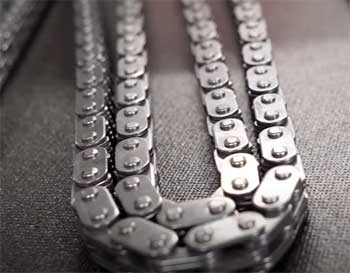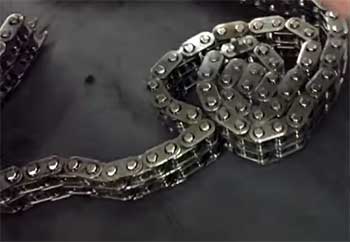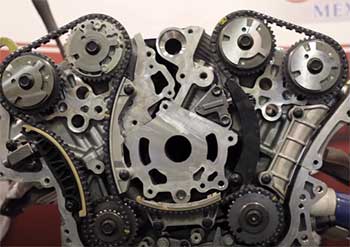If you’re looking to replace the timing chain on your vehicle, you may be wondering whether to go with an aftermarket Cloyes timing chain or stick with the original equipment manufacturer (OEM) part.
Both have their pros and cons, so let’s take a detailed look at how they compare.
A Brief Comparison Table
| Feature | Cloyes Timing Chain | OEM Timing Chain |
| Cost | 15-40% less expensive than OEM | More expensive than aftermarket |
| Fitment | Reverse engineered to match OEM specs. May have minor fit issues | Engineered specifically for that vehicle. Perfect fit. |
| Durability | Very durable but marginally less than OEM | Optimized for durability by vehicle manufacturer |
| Noise | Slightly more noisy operation | Extremely quiet operation |
| Ease of Installation | Usually direct bolt-on, but may need adjustments | Engineered for easy, direct installation |
| Warranty | 1 year/12,000 miles limited warranty | Backed by automaker powertrain warranty |
| Brand Reputation | Trusted aftermarket brand since 1929 | OEM suppliers have close relationships with automakers |
Overview of Timing Chains
Before diving into the Cloyes vs OEM debate, let’s quickly go over what a timing chain does in your engine. The timing chain connects the crankshaft to the camshaft and ensures they rotate in sync.
It has to be extremely durable to withstand years of engine operation.
A timing chain failure can lead to complete engine failure, so you want to use a high-quality part. Some vehicles come with timing belts instead of chains, but timing chains are generally more durable and don’t require periodic replacement like belts.
Cloyes Timing Chains – The Aftermarket Option
Cloyes is one of the most popular aftermarket manufacturers of timing chains. Here’s an overview of their products:

- Broad coverage: Cloyes offers timing chains for a wide range of makes and models, both domestic and imported. They aim to provide replacement chains for most vehicles on the road.
- Cost savings: Aftermarket chains are generally 15-40% cheaper than OEM parts. The savings add up especially when doing repairs on multiple vehicles.
- Quality materials: Cloyes says their chains are made from hardened steel or iron alloys. They use premium materials to ensure durability.
- Precision manufacturing: Cloyes uses advanced machining processes and heat treatment to produce chains within tight tolerances. This results in a chain that meshes correctly with the sprockets.
- Special coatings: Some Cloyes chains feature unique coatings that reduce friction and wear. This enhances longevity.
- Easy installation: Cloyes says their chains go in just like the original part without any modifications needed. They include detailed instructions.
- Warranty: Most Cloyes timing chain kits come with a 12 month or 12,000 mile limited warranty. This protects against early failure.
OEM Timing Chains – The Dealer Option
Now let’s see how OEM chains from the dealer compare:
- Perfect fit: OEM chains are engineered by the vehicle manufacturer specifically for that engine. This ensures optimal compatibility and performance.
- Higher cost: Dealer chains can cost significantly more than the Cloyes alternative – often 80-150% higher. The price is hard to swallow when repairing multiple vehicles.
- Dealer supply chain: OEM parts go through the automaker’s supply chain, passing quality control checkpoints along the way before reaching your dealer’s shelf. This rigorous process instills confidence.
- Newest designs: OEM chains represent the newest designs introduced on later model years. You get the latest materials and engineering innovations.
- Mechanic familiarity: Your local mechanic is undoubtedly more familiar with installing the OEM part they’ve put on hundreds of times before. There’s less guesswork involved.
- Manufacturing techniques: OEM suppliers use techniques like heat treating, shot peening, and microfinishing to produce durable chains. Processes are tailored to each engine.
- Warranty support: Installing an OEM chain won’t void any warranties and is always recommended by the dealer. It carries the automaker’s backing.
Also Read: Comparison of EZ And Fumoto Oil Drain Valves.
Key Differences Between Cloyes Timing Chain And OEM Timing Chain
Now that we’ve covered the basic pros and cons of each option, let’s do a more detailed comparison.
Durability
This is one of the most important considerations when selecting a timing chain. You need it to last many years and miles without stretching, slipping, or breaking. Both options deliver on durability:

- Cloyes chains undergo extensive testing to validate their long service life. Tooth-to-tooth fit and rocker joint pivots are closely controlled. While not quite OEM-grade, they should provide years of reliable performance.
- OEM chains are manufactured by the pros who engineered the engine. They’ve run physical tests measuring chain stretch under extreme conditions most drivers will never experience. Their intimate knowledge of the engine helps them achieve maximum durability.
Slight advantage goes to OEM here, but both deliver durable performance.
Proper installation is also key to achieving longevity.
Noise
A noisy timing chain is annoying and can signal wear. But some noise is inevitable, especially as engines accumulate miles. How do the options compare when it comes to noise?
- Cloyes chains tend to be slightly noisier than OEM according to many mechanics. This is because the chain shape and sprocket teeth often don’t mesh quite as perfectly as the factory parts. Proper installation minimizes noise.
- OEM chains engineered by the automaker mesh extremely well with engine components, resulting in less noise. The factory knows exactly how the crank and cams should align. OEM chains should be quieter throughout their lifespan.
Noise depends on specific engine design and condition of other parts like guides and tensioners. But OEM chains likely have the edge when it comes to running smoothly and quietly.
Fitment
The timing chain must perfectly interface with sprockets and guides within very tight tolerances to function:
- Cloyes chains are reverse engineered to match OEM specs but advertised to fit a wider range of vehicles. This means the shape and spacing may not perfectly match your specific engine, even if Cloyes says it fits. There could be minor alignment issues.
- OEM chains are tailor-made by automaker engineers for that exact engine. All components mesh seamlessly from the start. No guessing or small mismatches. OEM is unquestionably the winner when it comes to fit.
If going with Cloyes, confirm the exact fitment for your vehicle before purchasing. Better fitment means better performance.
Cost Savings
This is the main appeal of aftermarket parts – the lower price:
- Cloyes chains provide cost savings of 15-40% compared to OEM. For repairs on multiple vehicles, this adds up substantially. The price difference is enough to sway many consumers.
- OEM chains carry the premium cost that comes from the automaker supply chain. For a single repair, the higher OEM cost may not break the bank. But fleet and repair shop owners need to keep costs down.
Cloyes provides significant savings over OEM. Of course, the cheaper chain may not last quite as long, reducing the long-term value. But for those looking to save, Cloyes delivers.
Ease of Installation
Replacing a timing chain is very labor intensive. Anything that simplifies installation helps:
- Cloyes chains generally don’t require any modifications for installation. But technicians say that occasionally the aftermarket chain doesn’t line up perfectly with guides or sprockets since it wasn’t engineered for that exact vehicle. This can complicate installation.
- OEM chains are made specifically for that motor so everything lines up precisely. The factory part just bolts into place smoothly without forcing or tweaking. OEM makes the installer’s job easier.
Experienced mechanics may have no issues installing Cloyes chains. But for DIYers, OEM provides the most trouble-free installation.
Warranty Coverage
The warranty provides assurance if the part fails early:

- Cloyes chains typically come with a limited 12 month/12,000 mile warranty. This protects against defects. However, wear and tear or improper installation may not be covered since Cloyes has no control over this. You’ll have to pay for removal and shipping too.
- OEM chains let you take advantage of the automaker’s lengthy powertrain warranty if still in effect. Dealer-backed coverage gives more consumer protection. But the automaker still doesn’t warrant improper installation or normal wear.
Cloyes gives peace of mind for a year while OEM coverage could last longer if the factory powertrain warranty hasn’t expired.
Read the fine print on both warranties.
Quality Reputation
Brand reputation matters when choosing parts. Both Cloyes and OEM suppliers have strong quality reps:
- Cloyes has been in business since 1929 manufacturing timing drive parts. They have decades of experience with chains and sprockets. While not every chain is perfect, they have worked hard to match OEM quality at an affordable price.
- OEM suppliers like BorgWarner and Tsubaki are trusted by major automakers to manufacture timing drive components reliably year after year. These top-tier suppliers often have close relationships with vehicle manufacturers spanning decades. Their reputation is staked on OEM quality.
Both Cloyes and OEM suppliers have good reputations when it comes to timing chains. OEM suppliers certainly have more data and close coordination with automakers. But Cloyes has gained trust through decades in the aftermarket.
Also Read: Comparison of Blue Ox Patriot And Brake Buddy.
Frequently Asked Questions (FAQ)
Cloyes has a solid reputation in the aftermarket and provides quality timing chains at an affordable price. While not quite OEM-grade, their chains offer reliable performance when installed properly. They should perform well for many years.
For OEM parts, BorgWarner and Tsubaki are trusted suppliers to major automakers. In the aftermarket, Cloyes and Iwis are respected brands that offer kits with chains, guides, tensioners, and sprockets needed for timing chain replacement. OEM kits match your vehicle precisely.
Cloyes is headquartered in Indiana and operates a 180,000 square foot production facility there. Some components may be sourced from Asia depending on part complexity, volume, and costs. Cloyes says they always require the same quality standards no matter where production takes place.
The ACDelco brand represents GM OEM parts. GM utilizes multiple suppliers like BorgWarner and Tsubaki to manufacture timing chains for different GM engines. These suppliers work closely with GM engineers to design and produce chains exclusively for GM vehicles and engines.
The Bottom Line
Cloyes and OEM chains both deliver thousands of miles of reliable service life. OEM chains edge out Cloyes when it comes to perfect fit, noise, and long-term durability since they’re engine-specific.
But Cloyes costs significantly less while still offering solid performance.
For most drivers doing a single repair, the OEM chain is worth paying extra for. But fleets and mechanics replacing many chains may find the savings from Cloyes adds up, even if longevity suffers slightly.
There’s no universally best option – choose based on your budget, length of ownership, and comfort with aftermarket parts.

